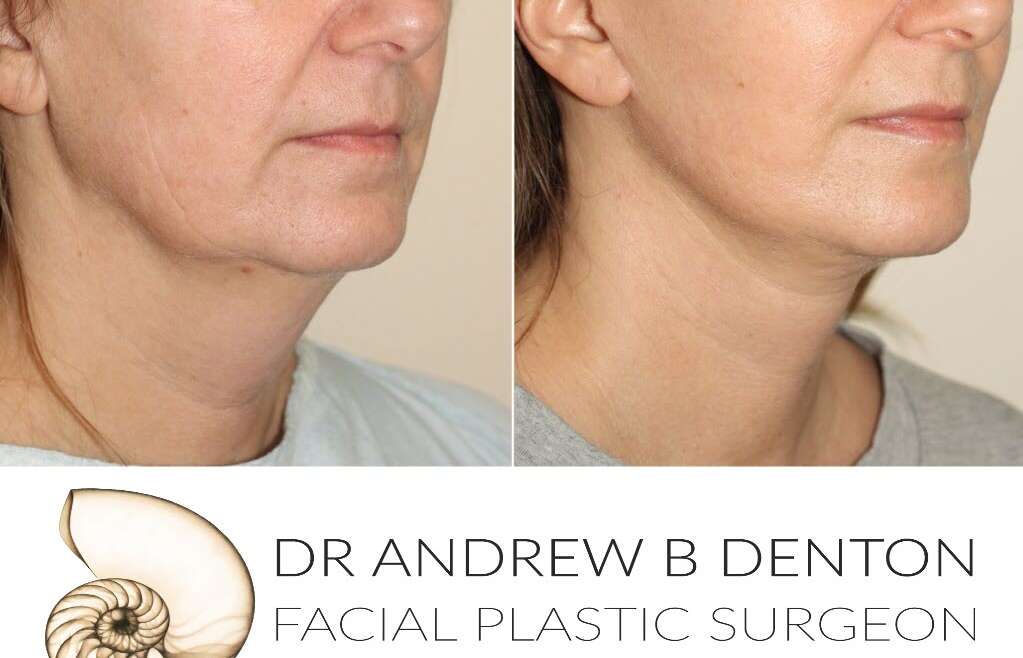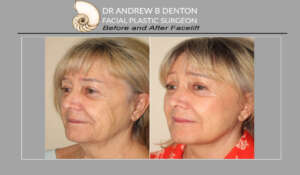A facelift, also known as rhytidectomy, is a surgical procedure designed to improve the visible signs of aging in the face and neck. As we age, our skin loses elasticity, leading to sagging, wrinkles, and fine lines. Many individuals in Vancouver consider this option to regain a youthful appearance and enhance their self-confidence. The decision to undergo a facelift is significant and requires careful thought, particularly regarding the financial aspect. Understanding the cost of a facelift is crucial for anyone contemplating this procedure.
In Vancouver, where the cost of living is relatively high, potential patients often wonder how much they should budget for a facelift. Dr Denton, a leading board-certified Facial Plastic Surgeon, would like to provide a comprehensive overview of the costs associated with facelifts, the factors that influence these costs, and expert insights to help you make an informed decision. We aim to help you achieve a clearer understanding of what to expect financially and how to navigate the process effectively.
Factors Influencing the Cost of Facelift Surgery
The cost of a facelift in Vancouver can range significantly. Here are some key factors that influence the price:
Plastic Surgeon’s Experience
Highly experienced surgeons often charge more due to their expertise and reputation. A surgeon with a strong track record and specialized training in cosmetic surgery may command higher fees, but many patients feel the investment is worth it for the quality of care and results. For instance, a surgeon who has performed thousands of facelifts will likely have refined techniques that can lead to better outcomes.
Location of Surgical Facility
The cost can vary depending on the clinic’s location within Vancouver. Urban areas may have higher prices due to increased overhead costs. Clinics in more affluent neighborhoods may also charge more, reflecting the local market’s dynamics. Additionally, the ambiance and amenities of the clinic can influence pricing, with more luxurious facilities often charging a premium.
Type of Facelift
There are different types of facelifts, such as full, mini, or non-surgical options, each with varying costs. Understanding the distinctions between these types can help you choose the one that best fits your needs and budget. For instance, a full facelift, which addresses the entire face and neck, will generally be more expensive than a mini facelift, which focuses on specific areas.
Facility Fees
The surgical facility’s costs can also impact the total price. High-quality facilities may charge more, but they often provide better safety standards and post-operative care. It’s essential to consider the reputation of the facility when evaluating costs. Some facilities may also include additional services, such as personalised care and advanced technology, which can justify higher fees.
Pre-operative and Post-operative Care
The costs associated with consultations, lab tests, and follow-up appointments can add to the overall expense. These are crucial for ensuring a successful outcome and monitoring your recovery. For example, pre-operative assessments may involve blood tests and imaging studies, while post-operative care may require additional visits to ensure proper healing.
Surgical Techniques Used
Different surgical techniques can also affect the cost. For example, advanced techniques that involve less invasive methods may have different pricing structures compared to traditional approaches. Facial plastic surgeons may use various methods to achieve desired results, and understanding these can help you make an informed choice.
Additional Procedures
Sometimes, people combine a facelift with other procedures like eyelid surgery or a brow lift. While this can create a more dramatic transformation, it also adds to the overall cost of facelift surgery. However, bundling procedures can sometimes lead to savings, so discuss this with your surgeon.
Understanding these factors can help you prepare for the financial aspect of your facelift journey and set realistic expectations. It’s also wise to have an open discussion with your surgeon about any concerns you may have regarding costs.
Types of Facelifts
When considering a facelift, it’s essential to know the different types available:
Full Facelift
This is the most comprehensive option, targeting the entire face and neck. It typically costs more due to the extensive nature of the procedure. A full facelift can address sagging skin, deep creases, and excess fat, providing a dramatic improvement in appearance. This type of facelift often involves making incisions around the hairline and behind the ears, allowing for significant tightening and lifting of facial tissues.
Mini Facelift
This option is less invasive and focuses on specific areas, such as the lower face. It usually costs less than a full facelift and is ideal for younger patients or those with less severe signs of aging. The recovery time is also shorter, making it a popular choice for many. A mini facelift typically involves smaller incisions and can be performed under local anesthesia, which may further reduce costs.
Non-Surgical Facelift
This includes treatments like fillers and Botox. While these are less expensive and involve minimal downtime, they also provide temporary results. Patients seeking a quick refresh may opt for these treatments, but it’s important to understand that they won’t provide the same long-lasting effects as surgical options. Non-surgical facelifts can be a good starting point for those not ready for surgery or who want to see subtle improvements.
Each type has its benefits and drawbacks, so it’s important to discuss options with your facial plastic surgeon. They can help you determine which procedure aligns with your aesthetic goals and budget. Additionally, they can provide insight into the expected outcomes and recovery times for each type.
The Role of Anesthesia
Anesthesia plays a significant role in the cost of facelift surgery. There are two main types used:
Local Anesthesia
This numbs only the area being treated and is often less expensive. It allows patients to remain awake during the procedure, which can be less intimidating for some. Local anesthesia is commonly used for mini facelifts and non-surgical procedures, as it can provide sufficient comfort while minimizing costs.
General Anesthesia
General anesthesia makes you completely unconscious during the procedure. It tends to be pricier due to the need for an anesthesiologist. Many patients prefer general anesthesia for comfort, especially during more extensive surgical procedures. The choice of anesthesia can affect the overall cost and should be discussed with your surgical team.
Twilight Anesthesia
Also known as conscious sedation, twilight anesthesia is another option that falls between local and general anesthesia. In this method, patients are given sedative medications that keep them relaxed and drowsy while still allowing them to respond to verbal commands.
Twilight anesthesia can be a great choice for patients who want to avoid the risks associated with general anesthesia but still desire a more relaxed experience than local anesthesia alone can provide. It often results in less anxiety and discomfort during the procedure, and many patients have little to no memory of the surgery afterward. It is important to note that while twilight anesthesia can be effective, it still requires monitoring by an anesthesiologist to ensure patient safety.
Your comfort and safety are paramount, so it’s essential to choose the option that best fits your needs. Discussing your preferences and concerns with your surgeon and anesthesiologist can help ensure a positive experience.
Recovery Time and Costs
Recovery time after a facelift can also influence the overall cost of your facelift. Here’s what to consider:
Time Off Work
Many patients take ten to fourteen days off work for recovery. This can lead to lost income, which should be factored into your budget. It’s essential to plan ahead and have support during this time. Some patients may require more time off depending on their job’s physical demands.
Post-Operative Care
Follow-up appointments and any necessary medications can add to costs. Your facial plastic surgeon will typically schedule several follow-ups to monitor your healing process, which is crucial for achieving the best results. Additionally, you may need to invest in specific skincare products or treatments to aid in your recovery.
Support During Recovery
Some patients may need help at home, which can also incur additional expenses. Having a friend or family member assist with daily activities can make a significant difference in your recovery experience. It’s advisable to arrange for someone to help with meals, transportation, and household chores during the initial recovery phase.
Planning for recovery is essential to avoid unexpected costs. Discussing your recovery plan with your surgeon can help you understand what to expect and how to prepare. They can provide guidance on managing pain, swelling, and other post-operative symptoms.
Additional Tips from an Expert
As a plastic surgeon with years of experience, Dr Denton has witnessed how a facelift can boost confidence and turn back the clock. But it’s crucial to have realistic expectations. A facelift isn’t a magic potion; it’s a surgical procedure. While cost is important, prioritize quality and safety. Don’t be swayed by suspiciously low prices that could compromise your care.
Here are some additional insights he offers, based on his experience:
- Choosing the right surgeon is key. Board certification by the Royal College of Physicians and Surgeons of Canada is a must. Look for surgeons who specialize in facial rejuvenation and have a proven track record of success.
- Be upfront about your goals and expectations during your consultation. The surgeon can then tailor a plan to achieve your desired outcome.
- Don’t be afraid to ask questions. A good surgeon will be happy to address any concerns you have.
How to Budget for a Facelift in Vancouver
To create a realistic budget, consult with a qualified plastic surgeon in Vancouver like Dr Denton. They can provide a detailed breakdown of all the costs, including their fees, anesthesia, facility charges, and any additional procedures.
Remember, a facelift is an investment in yourself. Choose a reputable surgeon and a facility that meets your needs and budget, not just the cheapest option.
Frequently Asked Questions
Here are some common questions people ask about the cost of facelifts in Vancouver:
- What is the average cost of a facelift in Vancouver?
The average cost is similar to most Canadian provinces, ranging from $10,000 to $20,000, depending on various factors. It’s essential to obtain a detailed quote from your surgeon, which should include all associated costs.
- Does insurance cover facelift surgery?
Most insurance plans do not cover cosmetic procedures, so it’s essential to check your policy. If the facelift is deemed medically necessary, there may be some coverage, but this is rare for purely cosmetic reasons.
- How long does the surgery take?
A facelift typically takes 3 to 6 hours, depending on the complexity of the procedure. Your surgeon will provide a more accurate estimate based on your specific case and the techniques used.
- What is the recovery time?
Most patients take about 10 to 14 days off work for recovery. However, full recovery can take several months, as swelling and bruising gradually subside. Patience is key during this healing process.
- Are there risks involved with facelift surgery?
Like any surgery, facelifts come with risks, including infection, scarring, and anesthesia complications. It’s important to discuss these risks with your surgeon and ensure you understand the potential outcomes.
- Can I finance my facelift?
Yes, at West Coast Cosmetic Surgery Centre, Dr Denton and his staff can help you arrange a financing plan with an outside financial institution. Be sure to inquire about available plans during your consultation, and consider your budget when exploring financing.
- How do I choose the right surgeon?
Look for board-certified surgeons with experience in facelifts and read patient reviews. Scheduling consultations with multiple surgeons can help you find the best fit for your needs. Trust your instincts and choose someone you feel comfortable with.
- What should I expect during the initial consultation?
During your initial consultation, your surgeon will evaluate your facial structure, discuss your goals, and provide information on the procedure, costs, and recovery. This is also an opportunity for you to ask any questions and clarify any concerns.
- Will I need someone to assist me after the surgery?
Yes, it’s advisable to have someone help you during the first few days of recovery. They can assist with daily activities and ensure you’re comfortable. Having support can significantly enhance your recovery experience.
- How can I prepare for my facelift surgery?
Preparing for surgery involves following your surgeon’s pre-operative instructions, which may include avoiding certain medications and smoking. It’s also helpful to arrange your home for comfort, such as having easy access to essentials and preparing meals in advance.
- What are the long-term effects of a facelift?
A facelift can provide long-lasting results, but it won’t stop the aging process. Regular skincare, a healthy lifestyle, and possibly future touch-up procedures can help maintain your youthful appearance.
- Is there anything I should avoid post-surgery?
Yes, it’s important to avoid strenuous activities, excessive sun exposure, and smoking during your recovery period. Following your surgeon’s post-operative care instructions is crucial for optimal healing.
Rejuvenate Your Appearance: Trust Dr. Denton for Your Facelift Journey
By understanding the costs and factors involved in facelift surgery, you can make an informed decision that aligns with your goals and budget. Whether you choose to proceed with a facelift or explore other options, knowledge is your best ally in this journey. Taking the time to research and consult with experts will empower you to make the best choice for your aesthetic desires and financial situation.
If you’re thinking about a facelift in Vancouver, consider consulting with Dr. Denton. With his extensive expertise and dedication to achieving outstanding results, you can be confident that your journey toward a more youthful look is in excellent hands. Here are several reasons to trust him as your facelift surgeon in Vancouver:
- Expertise and Experience: Dr. Denton is a board-certified facial plastic surgeon and an Assistant Clinical Professor in the Department of Surgery at the University of British Columbia. His vast experience in performing facelifts ensures that you will receive quality care and optimal results.
- Personalised Approach: Recognizing that each patient is distinct, Dr. Denton invests time in understanding your specific needs and aspirations. This tailored approach enables him to customise the procedure to align with your unique facial structure and aesthetic goals.
- State-of-the-Art Facility: Located at the West Coast Cosmetic Surgery Centre—a non-hospital surgical facility in Vancouver—Dr. Denton’s practice is equipped with the latest technology and maintains the highest standards of safety and hygiene. You can feel assured knowing you are in a professional and compassionate environment.
- Patient Satisfaction: Dr. Denton boasts a strong history of satisfied patients who have experienced impressive results from their facelifts. His commitment to excellence and patient care is reflected in the numerous positive testimonials from his clients.
Contact Dr. Denton’s clinic today to arrange a consultation and take the first step towards rejuvenating your appearance. With his expertise and personalised care, you can trust that you are in the best hands for your facelift procedure.



